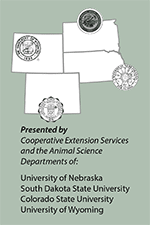Feed the Fetus
Reinaldo Cooke shares insight on generational nutrition and the importance of mineral supplementation.
Fetal programming is not a new topic of study by animal scientists. They’ve been doing research and sharing the results with cattle producers for several years. Some researchers prefer the term, generational nutrition, because it focuses attention on what’s happening — that the nutritional status of a pregnant cow has lasting effects on the calf she’s carrying.
During Range Beef Cow Symposium XXV, hosted Nov. 28-30 in Cheyenne, Wyo., Texas A&M University’s Reinaldo Cooke talked about generational nutrition, giving special attention to mineral supplementation of the gestating cow. Cooke spoke at a breakfast sponsored by Zinpro Corp. and Leachman Cattle of Colorado.
Cooke cautioned cattlemen in attendance to monitor body condition of pregnant cows, particular during the second and third trimesters. He reminded his audience of the research showing how a cow’s nutritional status impacts not only her newborn calf’s weight and vigor, but the calf’s health and performance all the way to weaning and beyond. Cow nutrition during gestation affects the calf’s performance in the feedlot and, when finished and harvested, its carcass merit.
Speaking specifically about mineral nutrition, Cooke cited studies conducted while at his former post at Oregon State University, which focused on mineral nutrition for pregnant cows. He called it something cattlemen sometimes overlook, particularly with regard to supplementing trace elements such as zinc, copper, manganese and cobalt. Cooke wanted to find out what difference mineral supplementation might make in terms of calf value returned to a rancher.
The study involved three groups of cows managed in the same range production setting, except that one group was supplemented during gestation with organic mineral, another group received an inorganic mineral supplement, and the third group received no supplemental mineral. Weaning weights of calves born to both groups of supplemented cows were superior to those posted by calves born to cows receiving no mineral supplement. Calves whose dams received inorganic mineral weighed 25 pounds (lb.) more, and calves born to dams receiving organic mineral weighed 54 lb. more, on average, than calves of dams receiving no mineral supplement.
Cooke said organic mineral afforded no measurable advantage, compared to inorganic mineral, to the cows, but study results suggest that supplementation with organic mineral enhanced the transfer of nutrients from dam to fetus during gestation. Tracking of calf performance and revenue suggests that organic mineral supplementation during gestation may increase calf value by as much as $70 per head. Following the calves through the finishing yard showed that calves out of organic mineral-supplemented cows exhibited lower incidence of respiratory disease and heavier carcass weights.
Cooke said the research suggests there may be an advantage in supplementing gestating cows at levels higher than their mineral requirement.
“This wasn’t about correcting a deficiency. It was about providing cows with just a little bit more than the basic requirement, and how there is a generational nutrition or fetal programming effect,” Cooke emphasized.
Editor’s Note: This summary was written under contract or by staff of the Angus Journal®, which retains the copyright. To request to reprint this article, contact the editor at 816-383-5200. PowerPoints are posted with permission of the presenter and may not be reproduced in whole or in part without the express permission of the presenter. Angus Journal claims copyright to this website as presented. We welcome educational venues and cattlemen to link to this site as a service to their audience.
The Angus Journal's coverage of the event is made possible through collaboration with the event committee. For questions about this site, or to notify us of broken links, click here. Look for additional coverage in the Angus Journal, the Angus Beef Bulletin, the Angus Journal Daily, the Angus Beef Bulletin EXTRA and The Angus Report.


